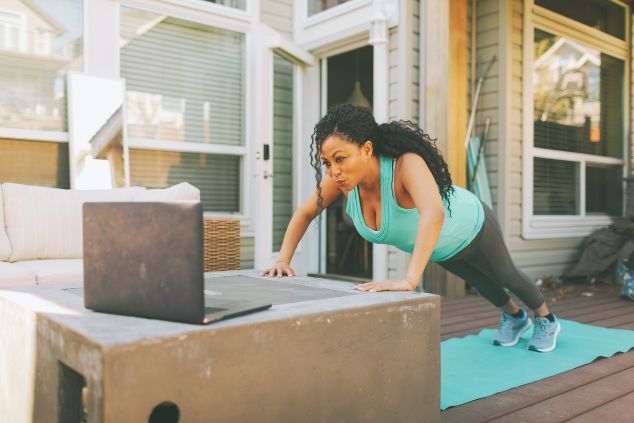After three years of working from home, remote work has turned from novelty to routine. But getting used to it has changed our own routines.
We talked to a few InterNations team members about the impact of our (almost) fully remote work policy. While three are mostly enthusiastic about the changes in their personal lives, there is one dissenting voice. All agree, though, that remote work is here to stay, with both its benefits and occasional drawbacks.
We’ve become more relaxed — especially in the morning.
The changes start with our morning routines. Corporate Communications Manager Kalena enjoys cozying up with her favorite sweatpants and a fluffy blanket before starting her workday. A cup of tea and a bit of reading help her get in a working mood: “It’s nice to tackle the day’s tasks when I’m in a really positive headspace,” she says.
For some team members, these changes also mean dressing more casually. There’s a reason why sweatsuits were an actual fashion trend during the height of the pandemic. Even at very casual workplaces — such as InterNations, which never had a dress code — clothing has become more comfy. Junior Product Manager Andrada jokingly describes herself as “someone who needed to wear make-up to go grocery shopping”.
“Now, I don’t feel this kind of social pressure anymore,” she explains. “Sure, it feels great to dress up sometimes. But everyone seems to have become more comfortable in their own skin, myself included.”
We’ve had to rethink our approach to physical activity.
But it’s easy to become a little too comfortable while working from home. For Andrada, this was a side-effect of the relatively strict lockdown regulations: “Before switching to remote work, I would easily hit the daily goals on my step counter. But then suddenly, you were barely allowed to leave the house anymore.”
The lack of an incentive to get moving started taking its toll. So, Andrada decided to be proactive about her health. She got a stationary bike and now makes a habit of trying different workouts to start the day off right.
Senior Product Manager Dominik agrees that working remotely requires a more conscious approach to exercising. “It’s not just about actual workouts,” he says. “It’s also important to incorporate lots of ‘micro-movements’ throughout the day. This applies to all office workers, but even more so to anyone working from home.”
We’ve discovered our creative side.
No longer having our daily commute also has its positive side, of course, like freeing up a lot of time. Remote work often comes with a more flexible schedule, too. The main point is that the work gets done, not when.
Kalena, for example, likes taking bike rides during an extended lunch break — a great way to get some exercise. Having more free time also allows her to get in touch with her creative side. “It’s the perfect treat to reward myself after a productive day at work,” she says. “And I don’t even have to commute back home to start. I can just pick up my latest sewing project right away.”
Andrada also has more energy after work, feeling less tempted to go on Netflix binges on the weekend. “I’ve been trying new things instead,” she says. “I’ve taken up painting, for example. It’s a very rewarding way of relaxing.”
We’re getting to spend more time with our families.
A less busy and more flexible schedule may also result in more time with our families — particularly if our partners are able to work from home too. Kalena likes to prepare tasty home-cooked meals with her husband, while Dominik enjoys exploring the neighborhood restaurants with his wife.
Quality time as a couple is especially important for parents of young children. “Going out for lunch together, without our kids, makes for a nice break,” Dominik says. “There’s a Vietnamese place with a pretty outdoor dining area just around the corner. In summer, it feels like a bit of an oasis for a lunch date, away from our everyday routines.”
We have more freedom to organize our lives.
The general flexibility of working remotely is also helpful when it comes to juggling chores. Especially, but not exclusively, for the parents on our team. “As a dad of two kids under the age of six, my days are tightly packed and very structured,” Dominik explains. “Working from home makes it a lot easier to run errands. Or I can use my lunch break to stay on top of the dishes and laundry.”
Kalena has used some of that new-found flexibility to cross some big goals off her personal to-do list: taking in-person German classes and getting her local driver’s license. “Thanks to my flexible schedule, I could take my driving lessons during off hours. That’s helped me avoid long waiting times,” she says. “I couldn’t have done that as easily without remote work.”
We may need to rethink our ways of socializing.
Working remotely may force us to rethink our entire way of socializing — both at work and outside of the office.
For our Ad Operations Manager Elvin, who moved from Albania to Munich, InterNations was his first fully remote job. Since he had to get used to a new company and a new country at the same time, he would have preferred an office environment during this initial transition period.
“If you want to have a chat with someone, you always need to schedule a call,” he explains. “And then it feels a bit like work, even if it’s just discussing last weekend’s football match.”
Fortunately, Elvin has lots of opportunities to socialize outside of work. He enjoys going out with his girlfriend. And he also has his get-togethers with the alumni club of his former international internship program.
At InterNations, he’s gone on two team trips, getting to know the rest of the team better. He goes to the office several times per week, too. (We’ve kept some office space in Munich, enough for about a fifth of our team.)
Elvin’s personal preference would be a hybrid model that combines working from home with regular days at the office. “I think hybrid work’s going to be a winner overall,” Elvin says. “Lots of big companies are now trying to get their employees back to the office, but most people probably don’t want to return full time.”
On this point, at least, Elvin and the others are in full agreement. “After experiencing remote work, I’d be okay with a hybrid model,” Andrada says. “But I would never want to work exclusively from the office again.”
Image credit: Canva/InterNations







This article perfectly captures the changes remote work has brought to our lives. From a mental health viewpoint, it’s essential to balance the newfound flexibility with physical activity and social connections. Adapting to these changes can significantly influence our mental well-being in this new work setting.
Working from home
International culture